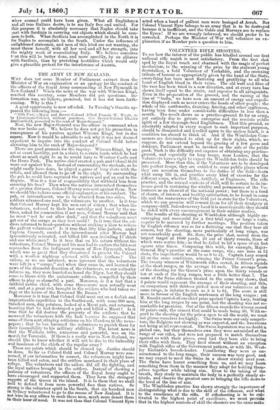THE ARMY IN NEW ZEALAND.
WILY does not some Member of Parliament extract from the Minister of War an explanation or an apology for the conduct of the officers of the Royal. Army commanding at New Plymouth in New Zealand ? When the news of the war with Wiremu Kingi, reached this country, some Members did put questions. In- formation was, we believe, promised, but it has not been forth- coming. Why is this ?
A good opportunity is now afforded. In Tuesday's Gazette ap- peared the following item :-
" 65th Foot.—Major and Brevet-Colonel Alfred Francis W. Wyatt, to be Lieutenant-Colonel, without purchase, vice Brevet.Coloncl Charles Emilius Gold, promoted to the rank of Major-General."
Now, the new Major-General was the officer in command when the war broke out. We believe he does not get his promotion in consequence of his services against Wiremu Kingi, but in due course. Now it would be advisable to ask why it was not deemed expedient to inquire into the conduct of Colonel Gold before elevating him to the rank of Major-General ?
There are good grounds for the inquiry. Wiremu Kingi, by an act of overt hostility, put in a claim to certain lands which he had about as much right to as he would have to Windsor Castle and the Home Park. The native chief erected a pah and Colonel Gold went out against him. Instead of surrounding the stockade, as he might easily have done, lie played a game of long shots with the rebels, and allowed them to go off in the night. By surrounding the pah he could have captured the natives and put an end to the dispute. Was it a fear of responsibility that withheld him from securing his foes? Then when the natives intrenched themselves at a greater distance, Colonel-Murray was sent against them. Now we should like to have some official explanation of his conduct. The pah, or intrenehment, was to be attacked from two sides. The soldiers advanced one road, the volunteers by another. Is it true that Colonel Murray kept his men out of action •, that when the volunteers, reduced to their last cartridge and beset by the na- tives, asked for ammunition if not men, Colonel Murray said that he must " not be out after dark," and that the volunteers must get out of the scrape as they best could ? Is it true that the sol- diers returned to head-quarters without strikine•b a blow to relieve the gallant volunteers ? Is it true that fifty blue jackets, under Captain Cracroft, carried the intrenehment after Murray had ignominiously retreated, and killed 150 men including 17 chiefs and one white man ? Is it tree that on his return without the volunteers, Colonel Murray and his men had to endure the bitterest' reproaches from the indignant women of New Plymouth, whose wrath was so great that they threatened to present the Colonel with a woollen nightcap adorned with white feathers ? The sailors, so we are informed, were ignorant that the volunteers were left in a " serape," and when they came in, and learned the news of the shameful desertion of the volunteers, so our authority informs us, they were hurried on board the Niger, lest they should come to blows with the unfortunate soldiers, compelled by their officer to play so shameful a part. Moreover, is it a fact that a faithful native chief, with some three-score men actually went out, and at a great risk brought in the settlers who had taken re- fuge at the house of the Reverend Mr. Brown ?
Moreover is it true that Colonel Gold went out on a foolish and impracticable expedition to the Southward, with some 600 men, threshed corn, dug potatoes, looked at a Maori pah, and returned, boasting that lie had destroyed a pah and killed a Maori ? Is it true that he did destroy the property of the settlers ; that he menaced the volunteers with the lash because he supposed that some of them sent stinging criticisms on his blunders, to the news- papers ; that lie has harassed the volunteers to punish them for their insensibility to his military abilities ? The latest news is that the Waikato tribe, numerous and powerful, was on the march for Taranaki. If there is a costly war in New Zealand, we should like to know whether it will not be due to the imbecility and insolence of the chiefs of the regular army ? These are points which should be cleared up. Justice should be done. So far as Colonel Gold and Colonel Murray were con- cerned, if our information be correct, the volunteers might have been killed and eaten, and the settlers murdered in their place of refuge. The volunteers and the sailors did all the fighting, and the loyal natives brought in the settlers. Instead of showing a jealousy of volunteers, the officers of the Royal Army ought to have encouraged and supported them. They form the strongest supert of the Queen in the island. It is to them that we shall look to defend it from more powerful foes than natives. So strong is the volunteer spirit in the South, that six hundred men in. Sydney -volunteered to go to the rescue of New Zealand. It is not wise in any offieer to snub these men, much more desert them in their hour of need. It was not thus that Colonel Vincent Eyre
acted when a band of gallant men were besieged at Arrah. But Colonel Vincent Eyre belongs to an army that is to be destroyed because it is inefficient, and the Golds and Murrays are to replace the Eyres ! If we are wrongly informed, we should prefer to be corrected. Perhaps the Minister of War will volunteer an ex- planation if no Member puts a question to him.


























 Previous page
Previous page